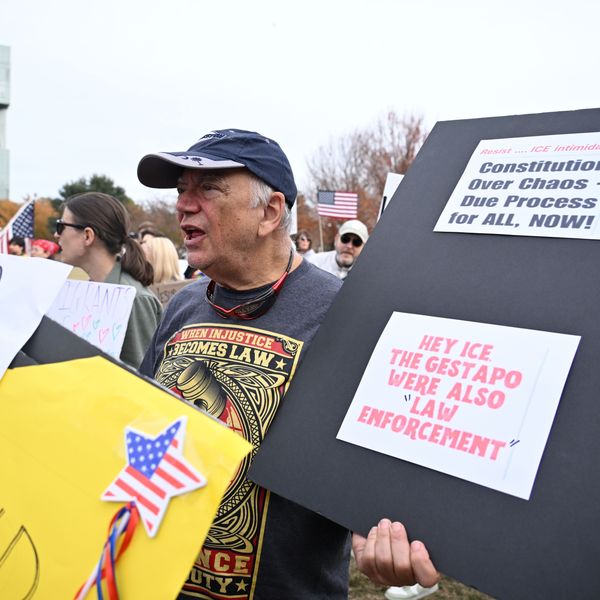'Not One Step Back': Moral Marchers Converge in North Carolina
Demonstrators rise up against attacks on voting and women's rights, economic justice, public education, equal protection under the law, and more
Rallying around a 14-point "People's Agenda," thousands gathered in downtown Raleigh, North Carolina on Saturday for the annual Moral March calling for livable wages, environmental justice, healthcare for all, an end to racism and inequality, and more.
The movement stands in opposition to "the extreme and regressive agenda being pushed in North Carolina"--an agenda it says is "a reflection of what is happening across the United States."
"We can never waver on these matters of moral principle, including economic justice through labor rights and fair living wages, equal education and funding for quality public schools, access to health care and the promise of a clean planet."
--Rev. Dr. William Barber, North Carolina NAACP
Organized by the state NAACP and more than 100 advocacy groups, the march is an extension of the Moral Monday actions that have been taking place in North Carolina since 2013. Participants will challenge recent attacks on voting and reproductive rights, economic justice, public education, equal protection under the law, and more, under the banner "Forward Together, Not One Step Back!"
"This is our Selma," Rev. Dr. William Barber, president of the North Carolina NAACP, told journalists in a press call earlier this month, invoking the 1965 civil rights marches in Alabama that led to passage of the Voting Rights Act and were recently represented on the big screen. "Selma can't merely be a movie, it must be a movement we engage in now. Everything they won in Selma is now being attacked and North Carolina is the clearest example of that."
As The Nation reports:
Since taking over state government in 2013, North Carolina Republicans passed the toughest voting restrictions in the country, declined Medicaid expansion for 500,000 North Carolinians, ended unemployment benefits, rescinded the earned income tax credit, cut public education funding and slashed taxes on the wealthy. Barber called the agenda 'regressivism on steroids.'
Moral Monday activist have fought the legislature's policies in the streets, in the courts and at the ballot box over the past two years. Over 1,000 people have been arrested during demonstrations at the legislature. The North Carolina NAACP has held 200 events in fifty-four counties. Young activists registered 5,000 new voters during the 'Freedom Summer 2014' campaign. Moral Monday spinoffs have begun in many other states.
Still, former North Carolina House Speaker Thom Tillis defeated incumbent Democrat Kay Hagan for a U.S. Senate seat in November 2014, and Republicans maintain their overwhelming majority in both chambers of the state's General Assembly.
In an op-ed published Thursday, Barber wrote: "If we continue steadfastly in a powerful moral movement to hold elected leaders accountable, we can restore the heart of politics and democracy in North Carolina. The heart is where we integrate what we know in our minds with what we know in our bones--the place where our knowledge can become more fully human. We can never waver on these matters of moral principle, including economic justice through labor rights and fair living wages, equal education and funding for quality public schools, access to health care and the promise of a clean planet."
Follow #MoralMarch actions on Twitter:
An Urgent Message From Our Co-Founder
Dear Common Dreams reader, The U.S. is on a fast track to authoritarianism like nothing I've ever seen. Meanwhile, corporate news outlets are utterly capitulating to Trump, twisting their coverage to avoid drawing his ire while lining up to stuff cash in his pockets. That's why I believe that Common Dreams is doing the best and most consequential reporting that we've ever done. Our small but mighty team is a progressive reporting powerhouse, covering the news every day that the corporate media never will. Our mission has always been simple: To inform. To inspire. And to ignite change for the common good. Now here's the key piece that I want all our readers to understand: None of this would be possible without your financial support. That's not just some fundraising cliche. It's the absolute and literal truth. We don't accept corporate advertising and never will. We don't have a paywall because we don't think people should be blocked from critical news based on their ability to pay. Everything we do is funded by the donations of readers like you. Will you donate now to help power the nonprofit, independent reporting of Common Dreams? Thank you for being a vital member of our community. Together, we can keep independent journalism alive when it’s needed most. - Craig Brown, Co-founder |
Rallying around a 14-point "People's Agenda," thousands gathered in downtown Raleigh, North Carolina on Saturday for the annual Moral March calling for livable wages, environmental justice, healthcare for all, an end to racism and inequality, and more.
The movement stands in opposition to "the extreme and regressive agenda being pushed in North Carolina"--an agenda it says is "a reflection of what is happening across the United States."
"We can never waver on these matters of moral principle, including economic justice through labor rights and fair living wages, equal education and funding for quality public schools, access to health care and the promise of a clean planet."
--Rev. Dr. William Barber, North Carolina NAACP
Organized by the state NAACP and more than 100 advocacy groups, the march is an extension of the Moral Monday actions that have been taking place in North Carolina since 2013. Participants will challenge recent attacks on voting and reproductive rights, economic justice, public education, equal protection under the law, and more, under the banner "Forward Together, Not One Step Back!"
"This is our Selma," Rev. Dr. William Barber, president of the North Carolina NAACP, told journalists in a press call earlier this month, invoking the 1965 civil rights marches in Alabama that led to passage of the Voting Rights Act and were recently represented on the big screen. "Selma can't merely be a movie, it must be a movement we engage in now. Everything they won in Selma is now being attacked and North Carolina is the clearest example of that."
As The Nation reports:
Since taking over state government in 2013, North Carolina Republicans passed the toughest voting restrictions in the country, declined Medicaid expansion for 500,000 North Carolinians, ended unemployment benefits, rescinded the earned income tax credit, cut public education funding and slashed taxes on the wealthy. Barber called the agenda 'regressivism on steroids.'
Moral Monday activist have fought the legislature's policies in the streets, in the courts and at the ballot box over the past two years. Over 1,000 people have been arrested during demonstrations at the legislature. The North Carolina NAACP has held 200 events in fifty-four counties. Young activists registered 5,000 new voters during the 'Freedom Summer 2014' campaign. Moral Monday spinoffs have begun in many other states.
Still, former North Carolina House Speaker Thom Tillis defeated incumbent Democrat Kay Hagan for a U.S. Senate seat in November 2014, and Republicans maintain their overwhelming majority in both chambers of the state's General Assembly.
In an op-ed published Thursday, Barber wrote: "If we continue steadfastly in a powerful moral movement to hold elected leaders accountable, we can restore the heart of politics and democracy in North Carolina. The heart is where we integrate what we know in our minds with what we know in our bones--the place where our knowledge can become more fully human. We can never waver on these matters of moral principle, including economic justice through labor rights and fair living wages, equal education and funding for quality public schools, access to health care and the promise of a clean planet."
Follow #MoralMarch actions on Twitter:
Rallying around a 14-point "People's Agenda," thousands gathered in downtown Raleigh, North Carolina on Saturday for the annual Moral March calling for livable wages, environmental justice, healthcare for all, an end to racism and inequality, and more.
The movement stands in opposition to "the extreme and regressive agenda being pushed in North Carolina"--an agenda it says is "a reflection of what is happening across the United States."
"We can never waver on these matters of moral principle, including economic justice through labor rights and fair living wages, equal education and funding for quality public schools, access to health care and the promise of a clean planet."
--Rev. Dr. William Barber, North Carolina NAACP
Organized by the state NAACP and more than 100 advocacy groups, the march is an extension of the Moral Monday actions that have been taking place in North Carolina since 2013. Participants will challenge recent attacks on voting and reproductive rights, economic justice, public education, equal protection under the law, and more, under the banner "Forward Together, Not One Step Back!"
"This is our Selma," Rev. Dr. William Barber, president of the North Carolina NAACP, told journalists in a press call earlier this month, invoking the 1965 civil rights marches in Alabama that led to passage of the Voting Rights Act and were recently represented on the big screen. "Selma can't merely be a movie, it must be a movement we engage in now. Everything they won in Selma is now being attacked and North Carolina is the clearest example of that."
As The Nation reports:
Since taking over state government in 2013, North Carolina Republicans passed the toughest voting restrictions in the country, declined Medicaid expansion for 500,000 North Carolinians, ended unemployment benefits, rescinded the earned income tax credit, cut public education funding and slashed taxes on the wealthy. Barber called the agenda 'regressivism on steroids.'
Moral Monday activist have fought the legislature's policies in the streets, in the courts and at the ballot box over the past two years. Over 1,000 people have been arrested during demonstrations at the legislature. The North Carolina NAACP has held 200 events in fifty-four counties. Young activists registered 5,000 new voters during the 'Freedom Summer 2014' campaign. Moral Monday spinoffs have begun in many other states.
Still, former North Carolina House Speaker Thom Tillis defeated incumbent Democrat Kay Hagan for a U.S. Senate seat in November 2014, and Republicans maintain their overwhelming majority in both chambers of the state's General Assembly.
In an op-ed published Thursday, Barber wrote: "If we continue steadfastly in a powerful moral movement to hold elected leaders accountable, we can restore the heart of politics and democracy in North Carolina. The heart is where we integrate what we know in our minds with what we know in our bones--the place where our knowledge can become more fully human. We can never waver on these matters of moral principle, including economic justice through labor rights and fair living wages, equal education and funding for quality public schools, access to health care and the promise of a clean planet."
Follow #MoralMarch actions on Twitter:

